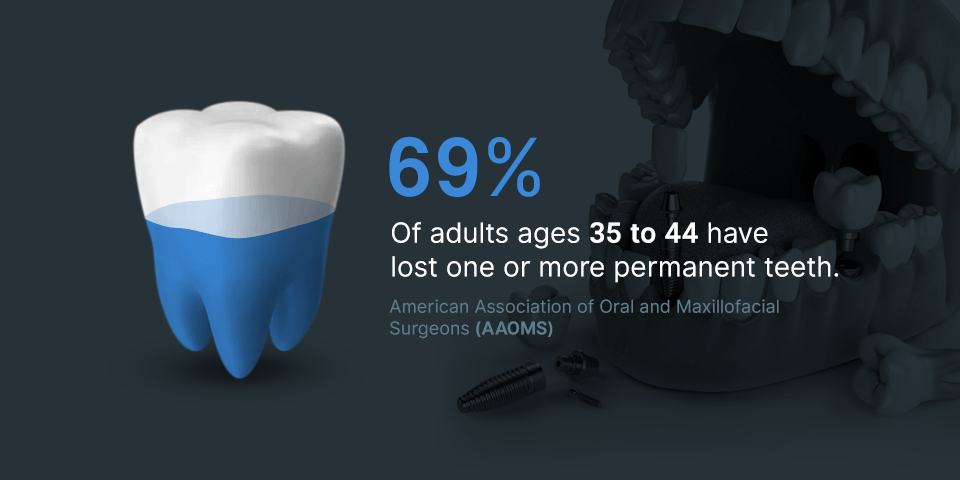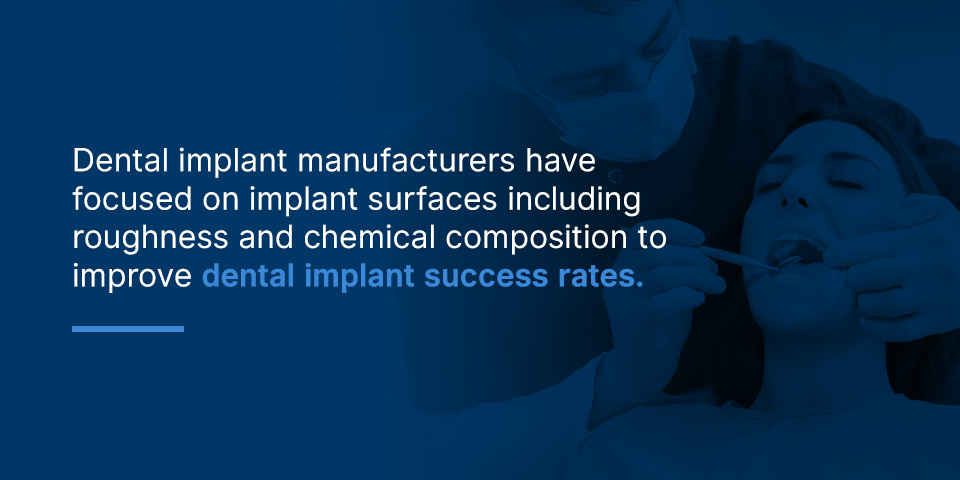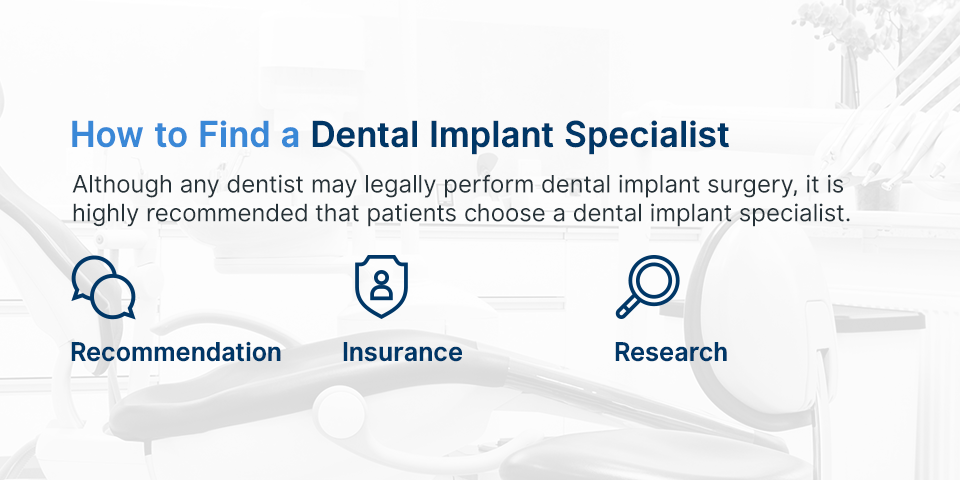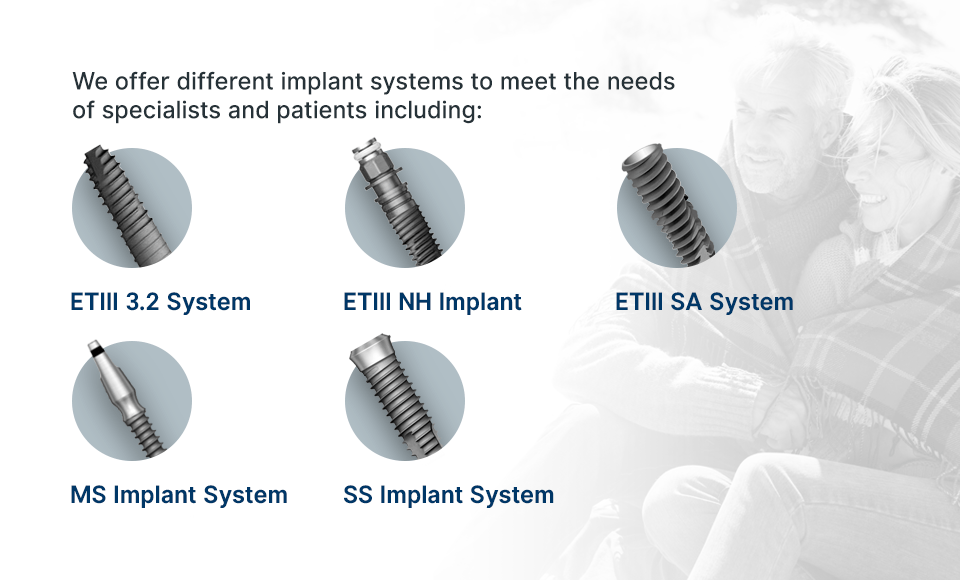August 29, 2018

Since the beginning of time, humans have been using some form of dental implants to replace missing teeth. In ancient Egypt, carved shells and bones were used as artificial teeth. In the 1930s in Honduras, archaeologists discovered dental implants dating back to about 600 A.D. that were made of shells.
The most important development in modern dental implantology took place in 1957 when Per-Ingvar Branemark, a Swedish orthopedic surgeon, discovered that titanium could successfully fuse with human bone. Branemark placed the first titanium dental implants in a patient in 1965. The implants lasted the patient’s lifetime. Now, about 450,000 dental implants are placed every year.
Patients and dentists prefer dental implants over other tooth replacement options for many reasons, including a high success rate. Nevertheless, there is plenty to learn about dental implants to determine if they are right for you.
Whether you are a patient considering dental implants or a dentist interested in offering dental implant treatment for your patients, this guide is for you. In this guide, we will explore the surgical aspect of dental implants as well as address common questions patients have about the dental implant process and the best types of dental implants available.

Tooth loss is widespread for many reasons ranging from gum disease to trauma. According to the American Association of Oral and Maxillofacial Surgeons (AAOMS), 69 percent of adults ages 35 to 44 have lost one or more permanent teeth. A dental implant is designed to replace a missing tooth and is composed of the following three parts:
Dental implants are placed in the jawbone to form a stable base for the crown. Unlike dentures, dental implants help stop or prevent jawbone loss. Before a patient undergoes dental implant surgery, they typically complete the following steps:

Depending on the patient’s condition, several procedures may be needed to create functional natural-looking dental implants. These might include:
When the patient’s jaw has adequate bone to support implants, they are ready for the procedure. Dental implant placement generally includes the following steps:
Patients usually have a lot of questions about the dental implant procedure and what to expect long-term. Here are common concerns regarding dental implants and the recovery process.

Recovery times vary between patients and depend on the procedures they need for success with dental implants. For example, if a patient requires a bone graft procedure, they will need to wait about two to three months for the bone graft to form new strong bone before continuing with the dental implant process.
Nevertheless, after the actual implant placement, many patients find they feel better faster than they expected. Some return to work the day after the procedure. Patients might experience bruising, swelling, slight bleeding and some discomfort as a result of dental surgery. Usually, over-the-counter pain medication is enough to help patients cope with post-surgery discomfort.
As the patient heals after the implant, they will undergo osseointegration, or the fusing of their jawbone with the implant. This process forms a solid foundation for their replacement teeth. Some patients might receive temporary teeth during this time. Osseointegration usually takes a few months. After osseointegration is complete, the specialist will place the abutment on top of the dental implant. Once the gums heal from the abutment placement, the specialist will place the custom-made crowns.
The entire dental implant process can take anywhere from three to nine months depending on the patient and how many implants and procedures they need.
Patients might ask if dental implants last forever. Dental implants are in fact designed to last a lifetime and have a success rate of 95 to 98 percent for periods of over 50 years. Dental implants have been found to last much longer than other tooth replacement options like dentures or dental bridges.
However, certain factors contribute to the success rate of implants. For example, patients who already practice good oral hygiene and keep regular dentist appointments improve their chances of long-term success.
The cost of dental implants varies among patients and depends on different factors, such as how many appointments and procedures are needed to complete the process. Patients should keep in mind that although other tooth-replacement options may have lower costs up-front, dental implants can last a lifetime, making them the most cost-effective choice in the long-run.
According to the New York Times, implants for the full mouth or partial mouth typically cost from $20,000 to as much as $45,000. A specialist will calculate costs based on the time they spent to complete the procedure and materials used.
Patients with dental insurance might have some coverage for the procedure. However, dental plans typically have a maximum annual limit. Most plans only cover basic dental care and do not cover dental implants. Medical insurance may cover parts of the procedure, depending on the individual and their plan.
A mentioned above, costs vary on the patient and the number of procedures needed. With that said, dental implant cost for a single tooth can be broken down in the following ways:
In total, the cost of a single dental implant can range from $4,300 to $6,500.

Although it is uncommon, a dental implant can fall out. This might occur due to any of the following reasons:
Patients need to make sure they choose an implant specialist who is experienced and who uses only the highest-quality implant materials. If a patient notices the implant is loose after the healing period, they should contact their dentist right away. They may need to get the implant replaced.
Patients might wonder what the dangers of dental implants are. However, if they go to a trained specialist, they should not have much to worry about. Problems with dental implants are rare, and when they occasionally occur, are usually easy to treat. Smoking or other medical conditions increase the risk of issues. Problems include:
Dental implants usually cost more than other forms of tooth replacement, but there are good reasons why dental implants are expensive. First, patients should consider that dental implants are an investment and designed to last a lifetime. Secondly, the dental implant procedure requires several steps before completion. When patients pay for dental implants, they are also paying for the following:
Dental implant placement is an involved process, but the results are worth it. With high-quality, properly-placed dental implants, a patient will have a natural-looking smile and should not have to worry about replacing teeth in the future.
A dental implant must be placed with a high level of precision, so it is vital for patients to choose a dentist with the skills and experience needed to perform implantation. Because dental implants are a surgical procedure, patients are advised to ask questions about experience and training before going to a general dentist for the procedure. Ideally, patients should go to a specialist such as an oral and maxillofacial surgeon or a periodontist.

Traditionally, the success rate of dental implants has been high, but sometimes, dental implants fail. Certain factors, like smoking, increase the risk of dental implant failure. On rare occasions, the bone does not properly fuse with the implant. Other factors that could cause dental implant failure include:
Symptoms of dental implant failure might include:
Dentists must ensure implants are stable from the beginning. Implants that do not have adequate initial stability have a failure rate of 32 percent.
Dental implants look, feel and function like natural teeth. They are the most effective option for a long-term natural smile. Unlike dentures, dental implants do not move around when patients eat or speak. Implants are customized to fit comfortably in a patient’s mouth and require the same care as natural teeth.
There are two main types of dental implants, which include:
Types of dental implant materials include titanium, titanium alloys, zirconium and gold. Titanium, including its alloy Ti-6 aluminum-4 vanadium, was the first modern material used for dental implants and remains the best dental implant material today. Compared to other materials, titanium has the longest lifespan to date. Commercially pure titanium is the preferred choice for dental implants because:
Zirconia implants may prove effective in the future, but more research is needed before they would become the standard. Zirconia requires special consideration to reduce the chance of failure.
Animal studies prove zirconia implants share similar characteristics to titanium implants. In some studies, zirconia implants healed similar to or even better than titanium implants. However, more research is needed on the long-term effects of zirconia implants in humans.
Other materials such as metal alloys composed of gold, stainless steel, and cobalt chromium have been used in the past but have led to adverse reactions and low success rates. Therefore, these materials are considered outdated in the industry.

Implants may be coated or sprayed with a variety of materials or molecules to promote cell attachment. This is because the physical and chemical characteristics of the implant surface are the most important factors in determining the speed and success of osseointegration. Dental implant manufacturers have focused on implant surfaces including roughness and chemical composition to improve dental implant success rates. Certain techniques, such as acid-etching, increase roughness and promote cell adhesion, greatly aiding the healing process and implant stability.

The dental implant procedure requires special training and knowledge. Although any dentist may legally perform dental implant surgery, it is highly recommended that patients choose a dental implant specialist. To locate a specialist, patients can follow these steps:

Hiossen® Implant is one of the top five dental implant companies in the world. At Hiossen, we are dedicated to developing high-quality, safe and innovative dental implants that clinicians and patients can trust. Our implants are the result of rigorous testing, research and expert recommendations. With a passion for providing superior dental implant solutions, we also provide research and education for dental specialists. Our goals include:

We offer different implant systems to meet the needs of specialists and patients including:
Hiossen Implant is committed to providing implants that make patients and dentists smile. We are proud to provide customer service and assistance that matches the quality of our products. To learn more information about our dental implants, specialized surgical kits, equipment or educational resources, contact us today!